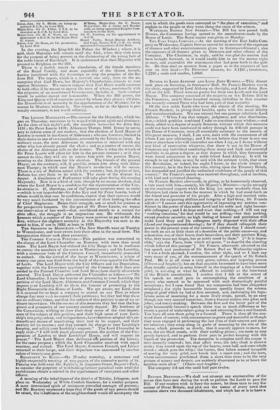DINNER TO LORD A1.1'110121. AND LORD JOHN RUSSELL.—This dinner took
place on Saturday, in Stationers' Hall. Sir Francis Burdett was in the chair, supported by Lord Althorp on the right, and Lord John Rus- sell on the left. There were no guests but these two Lords and the Lord Mayor. The company consisted of the majority on the Reform Bill in the Commons, nearly three hundred strong, including in that number the recently created Peers who had been part of that majority.
Of the two noble Lords who were the objects of the meeting, Sir Francis Burdett, in giving their healths, spoke with Iris usual felicity and warmheartedness. We can extract but one passage relative to Lord Althorp. " When I say that temper, judgment, and nice discrimina- tion,—which qualities combined I take to constitute true wisdom,—and these, added to a degree of manly firmness, without which this measure could not have been conducted in safety through its difficult passage in the House of Commons. were all essentially necessary to the success of this great measure, I shall, I am sure, meet with the concurrence otall whom I am now addressing; and I do not believe that there is any one here or elsewhere who will contradict me when I say, as I do say without any kind of reservation whatever, that there is not in the House of Commons any individual combining these many and high and essential qualities in so great a degree, as that degree in which they fortunately were found concurrent in my noble friend Lord Althorp. It will be enough to say of him, as may be said with the strictest truth, that since. the Revolution, or indeed, for aught I know, in the whole history of this country, he is the first man who, sitting upon the Treasury Bench, has demanded and justified the unlimited confidence of the people of this country." Sir Francis's speech was received throughout, and at its close, with loud and universal cheering.
Sir Francis Burdett afterwards, in giving, as he humorously observed, a rare toast with him—namely, his Majesty's Ministers—spoke strongly on the continued support which the King yet more markedly than his Ministers laid claim to from the manner in which he had stood forth as the friend and protector of his people. After a high and merited eulo- gium on the surpassing abilities and integrity of Earl Grey, Sir Francis. added—" I cannot omit this opportunity of expressing my anxious con- fidence in the power of that noble Lord and his noble and right honour- able colleagues ; and I do hope and trust that nothing,—I will not say
nothing vexatious,' for that would be too trifling,—but that nothing except absolute necessity, no high feeling of honour and patriotism will make Lord Grey and his colleagues easily disgusted with their office- (Loud and long-continuedeheering); for if they should relinquish their power in the present state of the country, I confess that I should consi- der such an act as little short of a desertion of the public cause—ay, and a desertion, too, of their brave, their benevolent, and their patriotic King, who, they must not forget, has so nobly stood by them." [" It is impos- sible," says the Times, from which we quote, " to describe the cheering which followed this passage."] Sir Francis afterwards adverted to the speech and confession of Sir Robert Peel on Wednesday night- " I was a little alarmed, I confess, the other night, and so I dare say were many of you, ae the commencement of the speech of Sir Robert Peel. He is at all times a very grave, solemn, and imposing person (Cheers earl laughter); but on that occasion Ire seemed to have been more than usually careful to array himself in the trappings of a fine funereal grief, in assisting at what he affected to consider as the interment of the British constitution. I confess that I felt at the outset of his speech no small pain in contemplating the condition of a person who seemed to be oppressed with such distressingly painful sensations ; but I soon found that my compassion had been altogether misplaced ; the right honourable baronet speedily forgot the solemn pomp of grief which he had at first assumed, and, exchanging his lugu- brious notes of mourning for a more lively strain, passed, by an easy though not very natural transition, from a funeral oration into gibes and jokes, and merry-making. Between the first and the latter part of the right honourable baronet's speech there was as much difference as be- tween a parcel of undertakers going to and returning from areal funeral. You have all seen them going to a funeral. There is then all the out- ward show of sorrow, with countenances as grave and mournful as though they were engaged in performing the last rites of their nearest and dear- est relatives ; they creep along in garbs of mourning by the side of the hearse, which proceeds so slowly, that it scarcely appears to move, for even the six black steeds, with their nodding plumes, are made to step- gently forward, and to perform their part in perfect keeping with the bipeds of the procession. The deception is complete until the corpse is once decently interred ; but, that affair over, the inky cloak is thrown aside; they crowd upon the top of the hearse, some half, and some whole drunk : smack goes the whip ; the horses, that before seemed incapable of moving for very grief, nosy break into a smart trot ; and the men, whose countenances proclaimed them a short time since to be the very picture of misery and despair, are suddenly discovered to be at heart the- merriest souls alive." (Cheers and laughter.)
The company did not rise until half past twelve.


























 Previous page
Previous page